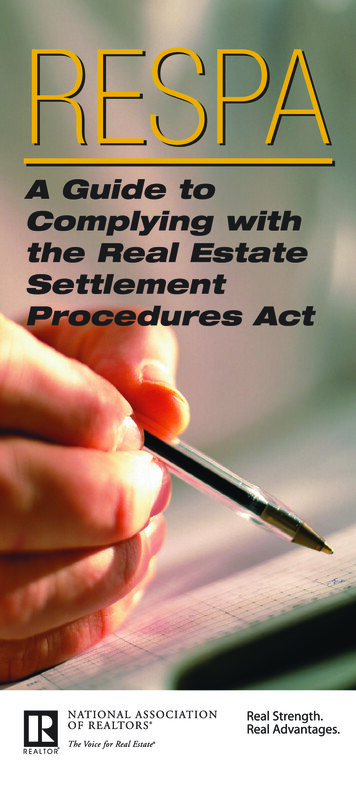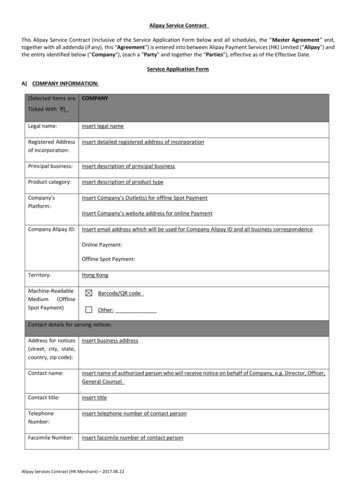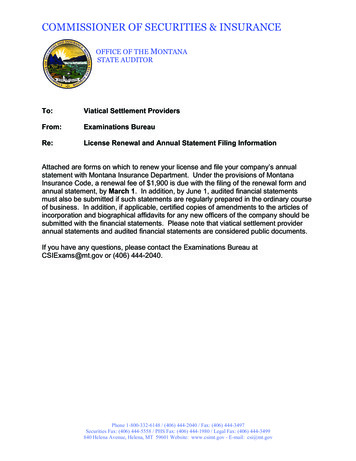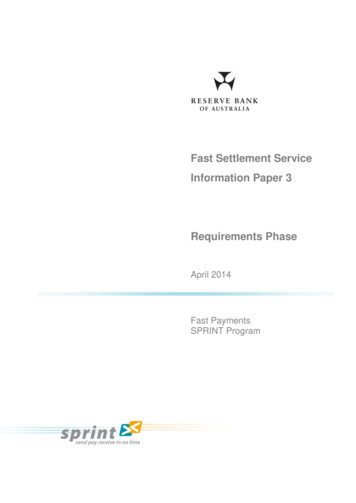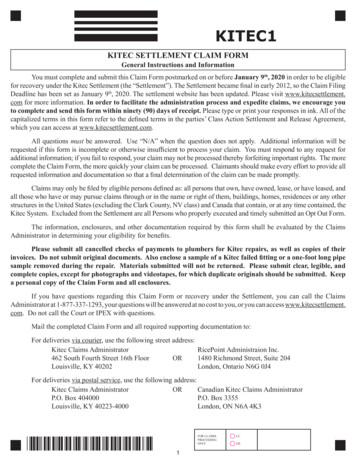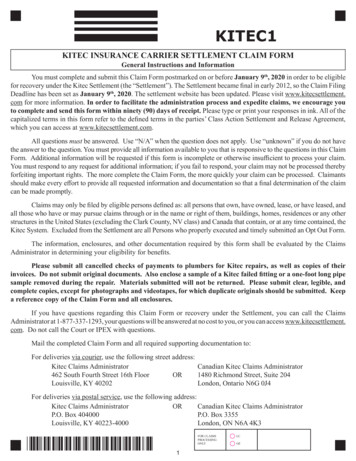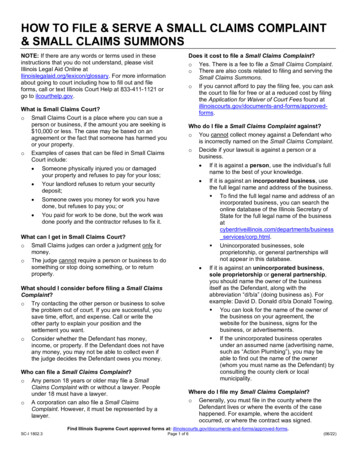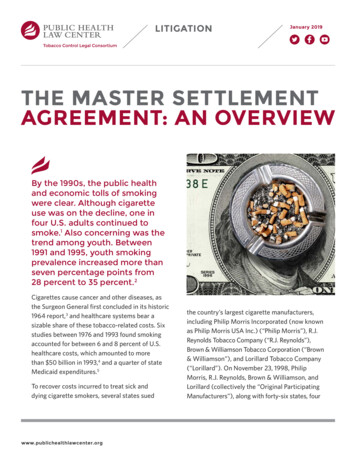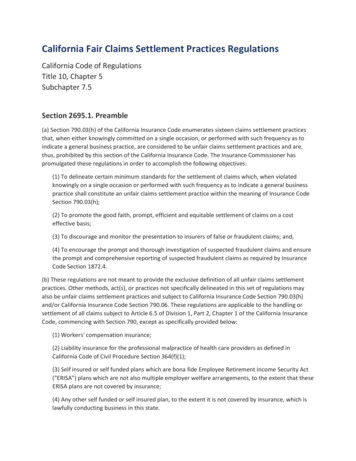
Transcription
California Fair Claims Settlement Practices RegulationsCalifornia Code of RegulationsTitle 10, Chapter 5Subchapter 7.5Section 2695.1. Preamble(a) Section 790.03(h) of the California Insurance Code enumerates sixteen claims settlement practicesthat, when either knowingly committed on a single occasion, or performed with such frequency as toindicate a general business practice, are considered to be unfair claims settlement practices and are,thus, prohibited by this section of the California Insurance Code. The Insurance Commissioner haspromulgated these regulations in order to accomplish the following objectives:(1) To delineate certain minimum standards for the settlement of claims which, when violatedknowingly on a single occasion or performed with such frequency as to indicate a general businesspractice shall constitute an unfair claims settlement practice within the meaning of Insurance CodeSection 790.03(h);(2) To promote the good faith, prompt, efficient and equitable settlement of claims on a costeffective basis;(3) To discourage and monitor the presentation to insurers of false or fraudulent claims; and,(4) To encourage the prompt and thorough investigation of suspected fraudulent claims and ensurethe prompt and comprehensive reporting of suspected fraudulent claims as required by InsuranceCode Section 1872.4.(b) These regulations are not meant to provide the exclusive definition of all unfair claims settlementpractices. Other methods, act(s), or practices not specifically delineated in this set of regulations mayalso be unfair claims settlement practices and subject to California Insurance Code Section 790.03(h)and/or California Insurance Code Section 790.06. These regulations are applicable to the handling orsettlement of all claims subject to Article 6.5 of Division 1, Part 2, Chapter 1 of the California InsuranceCode, commencing with Section 790, except as specifically provided below:(1) Workers' compensation insurance;(2) Liability insurance for the professional malpractice of health care providers as defined inCalifornia Code of Civil Procedure Section 364(f)(1);(3) Self insured or self funded plans which are bona fide Employee Retirement Income Security Act("ERISA") plans which are not also multiple employer welfare arrangements, to the extent that theseERISA plans are not covered by insurance;(4) Any other self funded or self insured plan, to the extent it is not covered by insurance, which islawfully conducting business in this state.
(c) In recognition of both the unique relationship which exists under a surety bond between the surety,the obligee or beneficiary, and the principal, and the fact that the processing of surety claims is subjectto the Unfair Practices Act, beginning with California Insurance Code Section 790, only sections 2695.1through 2695.6, inclusive, section 2695.10, and sections 2695.12, 2695.13 and 2695.14, inclusive, shallapply to the handling or settlement of claims brought under surety bonds.(d) These regulations apply to home protection contracts and home protection companies defined inCalifornia Insurance Code Section 12740.(e) All licensees, as defined in these regulations, shall have thorough knowledge of the regulationscontained in this subchapter.(f) Policy provisions relating to the investigation, processing and settlement of claims shall be consistentwith or more favorable to the insured than the provisions of these regulations.(g) The California Insurance Code provides the commissioner with access to all records of an insurer andthe power to examine the affairs of every person engaged in the business of insurance to determine ifsuch person is engaged in any unfair or deceptive act or practice. California Insurance Code Section790.03(h) requires all persons engaged in the business of insurance to effectuate prompt, fair andequitable settlements of claims and to otherwise process claims in a fair and reasonable manner. TheDepartment considers the use of reliable information to be an essential element of the fair andequitable settlement of claims. The fact that information, data or statistical methods used or relied uponby a licensee to process or establish the value of insurance claims is obtained through a third partysource shall not absolve the licensee of its legal responsibility to comply with these regulations or toeffectuate prompt, fair and equitable settlements of claims. Failure of a licensee to provide thecommissioner with requested information sufficient to examine the licensee's claims handling practicesmay justify a finding that the licensee was in non-compliance with these regulations or other applicableinsurance code provisions. Any and all information received pursuant to the Department's request shallbe given confidential treatment, as provided in California Insurance Code section 735.5 and CaliforniaGovernment Code Section 11180 et seq. When processing or establishing the value of a claim, a licenseeshall not be responsible for the accuracy of information provided by a governmental entity, unless thelicensee has discovered or been notified of the inaccuracy and has continued to use the information.NOTE: Authority cited: Sections 790.034, 790.10, 1871.1, 12340 - 12417, inclusive, 12921 and 12926 ofthe California Insurance Code and Sections 11342.2 and 11152 of the California Government Code.Reference: Sections 790.03, 790.04, 735.5 and 12740 of the California Insurance Code, and Section11180 et seq. of the California Government Code.Section 2695.2. DefinitionsAs used in these regulations:(a) "Beneficiary" means:(1) for the purpose of life and disability claims, the party or parties entitled to receive the proceedsor benefits occurring under the policy in lieu of the insured; or,
(2) for the purpose of surety claims, a person who is within the class of persons intended to benefitfrom the bond;(b) "Calendar days" means each and every day including Saturdays, Sundays, Federal and California StateHolidays, but if the last day for performance of any act required by these regulations falls on a Saturday,Sunday, Federal or State Holiday, then the period of time to perform the act is extended to andincluding the next calendar day which is not a Saturday, Sunday, or Federal or State holiday;(c) "Claimant" means a first or third party claimant as defined in these regulations, any person whoasserts a right of recovery under a surety bond, an attorney, any person authorized by operation of lawto represent the claimant, or any of the following persons properly designated by the claimant in themanner specified in subsection 2695.5(c): an insurance adjuster, a public adjuster, or any member of theclaimant's family.(d) "Claims agent" means any person employed or authorized by an insurer, to conduct an investigationof a claim on behalf of an insurer or a person who is licensed by the Commissioner to conductinvestigations of claims on behalf of an insurer. The term "claims agent", however, shall not include thefollowing:1) an attorney retained by an insurer to defend a claim brought against an insured; or,2) persons hired by an insurer solely to provide valuation as to the subject matter of a claim.(e) "Extraordinary circumstances" means circumstances outside of the control of the licensee whichseverely and materially affect the licensee's ability to conduct normal business operations;(f) "First party claimant" means any person asserting a right under an insurance policy as a namedinsured, other insured or beneficiary under the terms of that insurance policy, and including any personseeking recovery of uninsured motorist benefits;(g) "Gross settlement amount" means the amount tendered plus the amount deducted as provided inthe policy in the settlement of an automobile total loss claim;(h) "Insurance agent" means:(1) the term "insurance agent" as used in section 31 of the California Insurance Code; or,(2) the term "life agent" as used in section 32 of the California Insurance Code; or,(3) any person who has authority or responsibility to notify an insurer of a claim upon receipt of anotice of claim by a claimant; or,(4) an underwritten title company.(i) "Insurer" means a person licensed to issue or that issues an insurance policy or surety bond in thisstate, or that otherwise transacts the business of insurance in the state, including reciprocal andinterinsurance exchanges, fraternal benefit societies, stock and mutual insurance companies, riskretention groups, California county mutual fire insurance companies, grants and annuities societies,entities holding certificates of exemption, non-profit hospital service plans, multiple employer welfarearrangements holding certificates of compliance pursuant to Article 4.7 of the California Insurance Code,and motor clubs, to the extent that they transact the business of insurance in the State. The term
"insurer" for purposes of these regulations includes non-admitted insurers, the California FAIR Plan, theCalifornia Earthquake Authority, those persons licensed to issue or that issue an insurance policypursuant to an assignment by the California Automobile Assigned Risk Plan, home protection companiesas defined under California Insurance Code Section 12740, and any other entity subject to CaliforniaInsurance Code Section 790.03(h). The term "insurer" shall not include insurance agents and brokers,surplus line brokers and special lines surplus line brokers.(j) "Insurance policy" or "policy" means the written instrument in which any certificate of groupinsurance, contract of insurance, or non-profit hospital service plan is set forth. For the purposes ofthese regulations the terms insurance policy or policy do not include "surety bond" or "bond". For thepurposes of these regulations the term insurance policy or policy includes a home protection contract orany written instrument in which any certificate of insurance or contract of insurance is set forth that isissued pursuant to the California Automobile Assigned Risk Plan, the California Earthquake Authority, orthe California FAIR Plan;(k) "Investigation" means all activities of an insurer or its claims agent related to the determination ofcoverage, liabilities, or nature and extent of loss or damage for which benefits are afforded by aninsurance policy, obligations or duties under a bond, and other obligations or duties arising from aninsurance policy or bond.(l) "Knowingly committed" means performed with actual, implied or constructive knowledge, including,but not limited to, that which is implied by operation of law.(m) "Licensee" means any person that holds a license or Certificate of Authority from the InsuranceCommissioner, or any other entity for whom the Insurance Commissioner's consent is required beforetransacting business in the State of California or with California residents. The term "licensee" forpurpose of these regulations does not include an underwritten title company if the underwritingagreement between the underwritten title company and the title insurer affirmatively states that theunderwritten title company is not authorized to handle policy claims on behalf of the title insurer.(n) "Notice of claim" means any written or oral notification to an insurer or its agent that reasonablyapprises the insurer that the claimant wishes to make a claim against a policy or bond issued by theinsurer and that a condition giving rise to the insurer's obligations under that policy or bond may havearisen. For purposes of these regulations the term "notice of claim" shall not include any written or oralcommunication provided by an insured or principal solely for informational or incident reportingpurposes.(o) "Notice of legal action" means notice of an action commenced against the insurer with respect to aclaim, or notice of action against the insured received by the insurer, or notice of action against theprincipal under a bond, and includes any arbitration proceeding;(p) "Obligee" means the person named as obligee in a bond;(q) "Person" means any individual, association, organization, partnership, business, trust, corporation orother entity;"Principal" means the person whose debt or other obligation is secured or guaranteed by a bond andwho has the primary duty to pay the debt or discharge the obligation;
(s) "Proof of claim" means any evidence or documentation in the possession of the insurer, whether as aresult of its having been submitted by the claimant or obtained by the insurer in the course of itsinvestigation, that provides any evidence of the claim and that reasonably supports the magnitude orthe amount of the claimed loss.(t) "Remedial measures" means those actions taken by an insurer to correct or cure any error oromission in the handling of claims on the part of its insurance agent as defined in subsection 2695.2(h),including, but not limited to:(1) written notice to the insurance agent that he/she is in violation of the regulations contained inthis subchapter;(2) transmission of a copy of the regulations contained in this subchapter and instructions for theirimplementation;(3) reporting the error or omission in the handling of claims by the insurance agent to theDepartment of Insurance;(u) "Replacement crash part" means a replacement for any of the nonmechanical sheet metal or plasticparts which generally constitute the exterior of a motor vehicle, including inner and outer panels;(v) "Single act" for the purpose of determining any penalty pursuant to California Insurance CodeSection 790.035 is any commission or omission which in and of itself constitutes a violation of CaliforniaInsurance Code Section 790.03 or this subchapter;(w) "Surety bond" or "bond" means the written instrument in which a contract of surety insurance, asdefined in California Insurance Code Section 105, is set forth;(x) "Third party claimant" means any person asserting a claim against any person or the interests insuredunder an insurance policy;(y) "Willful" or "Willfully" when applied to the intent with which an act is done or omitted means simplya purpose or willingness to commit the act, or make the omission referred to in the California InsuranceCode or this subchapter. It does not require any intent to violate law, or to injure another, or to acquireany advantage.NOTE: Authority cited: Sections 132(d), 790.10, 12340 - 12417, inclusive, 12921 and 12926 of theCalifornia Insurance Code, Section 995.130 of the Code of Civil Procedure and Sections 11342.2 and11152 of the California Government Code. Reference: Sections 31, 32, 101, 106, 675.5(b), (c) and (d),676.6, 790.03(h) and 10082 of the California Insurance Code.Section 2695.3. File and Record Documentation(a) Every licensee's claim files shall be subject to examination by the Commissioner or by his or her dulyappointed designees. These files shall contain all documents, notes and work papers (including copies ofall correspondence) which reasonably pertain to each claim in such detail that pertinent events and thedates of the events can be reconstructed and the licensee's actions pertaining to the claim can bedetermined;(b) To assist in such examination all insurers shall:
(1) maintain claim data that are accessible, legible and retrievable for examination so that an insurershall be able to provide the claim number, line of coverage, date of loss and date of payment of theclaim, date of acceptance, denial or date closed without payment. This data must be available for allopen and closed files for the current year and the four preceding years;(2) record in the file the date the licensee received, date(s) the licensee processed and date thelicensee transmitted or mailed every material and relevant document in the file; and(3) maintain hard copy files or maintain claim files that are accessible, legible and capable ofduplication to hard copy; files shall be maintained for the current year and the preceding four years.(c) The requirements of this section shall be satisfied where the licensee provides documentationevidencing inability to obtain data, nonexistence of data, or difficulty in obtaining clear documentarysupport for actions due to catastrophic losses, or other unusual circumstances providing the licenseeestablishes to the satisfaction of the Commissioner that the circumstances alleged by the licensee doexist and have materially affected the licensee's ability to comply with this regulation. Any licensee thatalleges an inability to comply with this section shall establish and submit to the Commissioner a plan forfile and record documentation to be used by such licensee while the circumstances alleged to precludecompliance with this subsection continue to exist.NOTE: Authority cited: Sections 790.04, 790.10, 12340 - 12417, inclusive, 12921 and 12926 of theCalifornia Insurance Code and Sections 11342.2 and 11152 of the California Government Code.Reference: Section 790.03(h) of the California Insurance Code.Section 2695.4. Representation of Policy Provisions and Benefits(a) Every insurer shall disclose to a first party claimant or beneficiary, all benefits, coverage, time limitsor other provisions of any insurance policy issued by that insurer that may apply to the claim presentedby the claimant. When additional benefits might reasonably be payable under an insured's policy uponreceipt of additional proofs of claim, the insurer shall immediately communicate this fact to the insuredand cooperate with and assist the insured in determining the extent of the insurer's additional liability.(b) No insurer shall misrepresent or conceal benefits, coverages, time limits or other provisions of thebond which may apply to the claim presented under a surety bond.(c) No insurer shall deny a claim on the basis of the claimant's failure to exhibit property, unless there isdocumentation in the file (1) of reasonable demand by the insurer, and unfounded refusal by theclaimant, to exhibit property, or (2) of the breach of any policy provision providing for the exhibition ofproperty.(d) Except where a time limit is specified in the policy, no insurer shall require a first party claimantunder a policy to give notification of a claim or proof of claim within a specified time.(e) No insurer shall:(1) request that a claimant sign a release that extends beyond the subject matter which gave rise tothe claim payment unless, prior to execution of the release, the legal effect of the release isdisclosed and fully explained by the insurer to the claimant in writing. For purposes of this
subsection, an insurer shall not be required to provide the above explanation or disclosure to aclaimant who is represented by an attorney at the time the release is presented for signature;(2) be precluded from including in any release a provision requiring the claimant to waive theprovisions of California Civil Code Section 1542, provided that, prior to execution of the release, thelegal effect of the release is disclosed and fully explained by the insurer to the claimant in writing.For purposes of this subsection, an insurer shall not be required to provide the above explanation ordisclosure to a claimant who is represented by an attorney at the time the release is presented forsignature.(f) No insurer shall issue checks or drafts in partial settlement of a loss or claim that contain or areaccompanied by language releasing the insurer, the insured, or the principal on a surety bond from totalliability unless the policy or bond limit has been paid, or there has been a compromise settlementagreed to by the claimant and the insurer as to coverage and amount payable under the insurancepolicy or bond.(g) No insurer shall require a first party claimant or beneficiary to submit duplicative proofs of claimwhere coverage may exist under more than one policy issued by that insurer.NOTE: Authority cited: Sections 790.10, 12340 - 12417, inclusive, 12921 and 12926 of the CaliforniaInsurance Code and Sections 11342.2 and 11152 of the California Government Code. Reference: Section790.03(h)(1), (3) and (4) of the California Insurance Code.Section 2695.5. Duties upon Receipt of Communications(a) Upon receiving any written or oral inquiry from the Department of Insurance concerning a claim,every licensee shall immediately, but in no event more than twenty-one (21) calendar days of receipt ofthat inquiry, furnish the Department of Insurance with a complete written response based on the factsas then known by the licensee. A complete written response addresses all issues raised by theDepartment of Insurance in its inquiry and includes copies of any documentation and claim filesrequested. This section is not intended to permit delay in responding to inquiries by Departmentpersonnel conducting a scheduled examination on the insurer's premises.(b) Upon receiving any communication from a claimant, regarding a claim, that reasonably suggests thata response is expected, every licensee shall immediately, but in no event more than fifteen (15) calendardays after receipt of that communication, furnish the claimant with a complete response based on thefacts as then known by the licensee. This subsection shall not apply to require communication with aclaimant subsequent to receipt by the licensee of a notice of legal action by that claimant.(c) The designation specified in subsection 2695.2(c) shall be in writing, signed and dated by theclaimant, and shall indicate that the designated person is authorized to handle the claim. Alldesignations shall be transmitted to the insurer and shall be valid from the date of execution until theclaim is settled or the designation is revoked. A designation may be revoked by a writing transmitted tothe insurer, signed and dated by the claimant, indicating that the designation is to be revoked and theeffective date of the revocation.(d) Upon receiving notice of claim, every licensee or claims agent shall immediately transmit notice ofclaim to the insurer.
(e) Upon receiving notice of claim, every insurer shall immediately, but in no event more than fifteen(15) calendar days later, do the following unless the notice of claim received is a notice of legal action:(1) acknowledge receipt of such notice to the claimant unless payment is made within that period oftime. If the acknowledgment is not in writing, a notation of acknowledgment shall be made in theinsurer's claim file and dated. Failure of an insurance agent or claims agent to promptly transmitnotice of claim to the insurer shall be imputed to the insurer except where the subject policy wasissued pursuant to the California Automobile Assigned Risk Program.(2) provide to the claimant necessary forms, instructions, and reasonable assistance, including butnot limited to, specifying the information the claimant must provide for proof of claim;(3) begin any necessary investigation of the claim.(f) An insurer may not require that the notice of claim under a policy be provided in writing unless suchrequirement is specified in the insurance policy or an endorsement thereto.NOTE: Authority cited: Sections 790.04, 790.10, 12340 - 12417, inclusive, 12921, 12926 of the CaliforniaInsurance Code and Sections 11342.2 and 11152 of the California Government Code. Reference:Sections 790.03(h)(2) and (3) of the California Insurance Code.Section 2695.6 Training and Certification(a) Every insurer shall adopt and communicate to all its claims agents written standards for the promptinvestigation and processing of claims, and shall do so within ninety (90) days after the effective date ofthese regulations or any revisions thereto.(b) All licensees shall provide thorough and adequate training regarding these regulations to all theirclaims agents. Licensees shall certify that their claims agents have been trained regarding theseregulations and any revisions thereto. However, licensees need not provide such training or certificationto duly licensed attorneys.A licensee shall demonstrate compliance with this subsection by the following methods:(1) where the licensee is an individual, the licensee shall annually certify in writing under penalty ofperjury that he or she has read and understands these regulations and any and all amendmentsthereto;(2) where the licensee is an entity, the annual written certification shall be executed, under penaltyof perjury, by a principal of the entity as follows:(A) that the licensee's claims adjusting manual contains a copy of these regulations and all amendmentsthereto; and,(B) that clear written instructions regarding the procedures to be followed to effect proper compliancewith this subchapter were provided to all its claims agents;(3) where the licensee retains insurance adjusters as defined in California Insurance Code Section14021, the licensee must provide training to the insurance adjusters regarding these regulations andannually certify, in a declaration executed under penalty of perjury, that such training is provided.
Alternately, the insurance adjuster may annually certify in writing, under penalty of perjury, that heor she has read and understands these regulations and all amendments thereto or has successfullycompleted a training seminar which explains these regulations;(4) a copy of the certification required by subsections 2695.6(b) (1), (2) or (3) shall be maintained atall times at the principal place of business of the licensee, to be provided to the Commissioner onlyupon request.(5) the annual certification required by this subsection shall be completed on or before September 1of each calendar year.NOTE: Authority cited: Sections 790.10, 12340 - 12417, inclusive, 12921 and 12926 of the CaliforniaInsurance Code and Sections 11342.2 and 11152 of the California Government Code. Reference: Section790.03(h)(3) of the California Insurance Code.Section 2695.7. Standards for Prompt, Fair and Equitable Settlements(a) No insurer shall discriminate in its claims settlement practices based upon the claimant's age, race,gender, income, religion, language, sexual orientation, ancestry, national origin, or physical disability, orupon the territory of the property or person insured.(b) Upon receiving proof of claim, every insurer, except as specified in subsection 2695.7(b)(4) below,shall immediately, but in no event more than forty (40) calendar days later, accept or deny the claim, inwhole or in part. The amounts accepted or denied shall be clearly documented in the claim file unlessthe claim has been denied in its entirety.(1) Where an insurer denies or rejects a first party claim, in whole or in part, it shall do so in writingand shall provide to the claimant a statement listing all bases for such rejection or denial and thefactual and legal bases for each reason given for such rejection or denial which is then within theinsurer's knowledge. Where an insurer's denial of a first party claim, in whole or in part, is based ona specific statute, applicable law or policy provision, condition or exclusion, the written denial shallinclude reference thereto and provide an explanation of the application of the statute, applicablelaw or provision, condition or exclusion to the claim. Every insurer that denies or rejects a thirdparty claim, in whole or in part, or disputes liability or damages shall do so in writing.(2) Subject to the provisions of subsection 2695.7(k), nothing contained in subsection 2695.7(b)(1)shall require an insurer to disclose any information that could reasonably be expected to alert aclaimant to the fact that the subject claim is being investigated as a suspected fraudulent claim.(3) Written notification pursuant to this subsection shall include a statement that, if the claimantbelieves all or part of the claim has been wrongfully denied or rejected, he or she may have thematter reviewed by the California Department of Insurance, and shall include the address andtelephone number of the unit of the Department which reviews claims practices.(4) The time frame in subsection 2695.7(b) shall not apply to claims arising from policies of disabilityinsurance subject to Section 10123.13 of the California Insurance Code, disability income insurancesubject to Section 10111.2 of the California Insurance Code or mortgage guaranty insurance subjectto Section 12640.09(a) of the California Insurance Code, and shall not apply to automobile repair
bills arising from policies of automobile collision and comprehensive insurance subject to Section560 of the California Insurance Code. All other provisions of subsections 2695.7(b)(1), (2), and (3)are applicable.(c)(1) If more time is required than is allotted in subsection 2695.7(b) to determine whether a claimshould be accepted and/or denied in whole or in part, every insurer shall provide the claimant, withinthe time frame specified in subsection 2695.7(b), with written notice of the need for additional time.This written notice shall specify any additional information the insurer requires in order to make adetermination and state any continuing reasons for the insurer's inability to make a determination.Thereafter, the written notice shall be provided every thirty (30) calendar days until a determination ismade or notice of legal action is served. If the determination cannot be made until some future eventoccurs, then the insurer shall comply with this continuing notice requirement by advising the claimant ofthe situation and providing an estimate as to when the determination can be made.(2) Subject to the provisions of subsection 2695.7(k), nothing contained in subsection 2695.7(c)(1) shallrequire an insurer to disclose any information that could reasonably be expected to alert a claimant tothe fact that the claim is being investigated as a possible suspected fraudulent claim.(d) Every insurer shall conduct and diligently pursue a thorough, fair and objective investigation andshall not persist in seeking information not reasonably required for or material to the resolution of aclaim dispute.(e) No insurer shall delay or deny set
California Fair Claims Settlement Practices Regulations California Code of Regulations Title 10, Chapter 5 Subchapter 7.5 Section 2695.1. Preamble . Department considers the use of reliable information to be an essential element of the fair and equitable settlement of claims. The fact that information, data or statistical methods used or .
